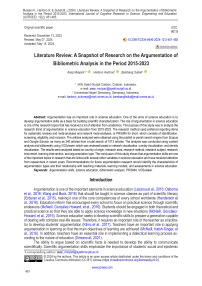Literature review: a snapshot of research on the argumentation of bibliometric analysis in the period 2015-2023
Автор: Mulyani A., Hartono H., Subali B.
Журнал: International Journal of Cognitive Research in Science, Engineering and Education @ijcrsee
Рубрика: Original research
Статья в выпуске: 2 vol.12, 2024 года.
Бесплатный доступ
Argumentation has an important role in science education. One of the aims of science education is to develop argumentation skills as a basis for building scientific characterization. The role of argumentation in science education is one of the research topics that has received a lot of attention from academics. The purpose of this study was to analyze the research trend of argumentation in science education from 2015-2023. The research method used preferred reporting items for systematic reviews and meta-analyses and network meta-analyses, or PRISMA for short, which consists of identification, screening, eligibility, and inclusion. The articles analyzed were obtained using the publish or perish search engine from Scopus and Google Scholar, as many as 340 articles from a total search of 1013 articles. The analysis was conducted using content analysis and bibliometric using VOSviewer, which was reviewed based on network visualization, overlay visualization, and density visualization. The results were analyzed based on country of origin, research area, research method, research subject, research instrument, learning intervention, and argumentation type. The conclusion of this study shows that argumentation skills are one of the important topics in research that are linked with several other variables in science education and have received attention from researchers in recent years. Recommendations for future argumentation research should identify the characteristics of argumentation types and their relationship with teaching materials, learning models, and assessments in science education.
Argumentation skills, science education, bibliometric analysis, prisma, vosviewer
Короткий адрес: https://sciup.org/170206414
IDR: 170206414 | УДК: 001.8 | DOI: 10.23947/2334-8496-2024-12-2-451-465
Текст научной статьи Literature review: a snapshot of research on the argumentation of bibliometric analysis in the period 2015-2023
Argumentation is one of the important elements in science education ( Lazarou et al., 2016 ; Osborne et al., 2016 ; Wang and Buck, 2016 ) that should be taught in science classes as part of scientific literacy ( Erduran et al., 2015 ), making it one of the core competencies of every school worldwide ( Henderson et al., 2018 ). Education reform has encouraged every school to focus on practical science through scientific endeavors ( McNeill, González-Howard, et al., 2016 ). Students should be engaged in both theoretical and practical science so that they are able to apply science knowledge in new situations ( McNeill, González- Howard, et al., 2016 ). Science education seeks to develop scientific skills to prepare a generation capable of dealing with complex real-life issues. Therefore, it requires an important role of the teacher as a facilitator to develop students’ argumentation ( Kilinc et al., 2017 ). Teachers have an important role in applying argumentation in learning so that the main objectives of learning are achieved ( McNeill, Katsh-Singer, et al., 2016 ). In addition, teachers have an essential role in implementing a dialectical learning process according to the nature of education ( Simonović, 2021 ).

© 2024 by the authors. This article is an open access article distributed under the terms and conditions of the Creative Commons Attribution (CC BY) license .
interactions to develop and critique knowledge ( Grooms et al., 2018 ). Several studies on scientific argumentation show that the topic of argumentation has a central role in science education research. The development of science education research trends over the years has undergone a significant shift. Research trends related to context in science learning have increased compared to other research topics in science education ( Lee et al., 2009 ; T.-C. Lin et al., 2014 ; T.-J. Lin et al., 2019 ). 21st-century skills have fueled several research topics that develop individuals’ ability to solve real-life problems. Argumentation skills, as an important part of science education, have become one of the research topics of great interest to academics.
The curriculum influences Science learning starting from the availability of teaching materials and the way teachers plan the learning process ( McNeill et al., 2017 ). 21st-century skills have encouraged learning that is able to develop higher-order thinking skills and argumentation skills in science learning ( Putri et al., 2021 ). Understanding the material and improving individual scientific skills are needed to deal with the complexity of real problems that will be faced. Argumentation skills play a role in science learning, improving conceptual understanding, developing critical thinking skills, and encouraging inquiry ( Faize et al., 2018 ). The evolution of research trends in science education has shifted from conceptual understanding to individual scientific skills that are contextualized.
The development of the times, accompanied by various global problems, whether environmental or humanitarian issues, has demanded the development of higher-order thinking skills. High-level thinking skills can be encouraged through argumentation methods both in learning and in daily life( Cankaya and Aydogan, 2022 ). Argumentation skills are one of the skills needed to deal with various complex problems. Science education has an important task in creating learning experiences that will develop argumentation skills so that individuals are able to face various problems that exist. Therefore, it is important for future generations to develop argumentation skills as part of the goals of science education.
Along with the development of technology, research trends can be carried out more optimally by using the Publish or Perish search application ( Dewi et al., 2021 ; Muhammad et al., 2022 ) and applications to visualize bibliometric data using VOSviewer ( Abdullah, 2022 ; Arruda et al., 2022 ; Cheng et al., 2021 ; Dede and Ozdemir, 2022 ; Nordin, 2022 ; Ubaidillah et al., 2023 ). Argumentation research trends will provide an overview for academics to determine the direction of further research has been done by ( Er- duran et al., 2015 ). Bibliometric ally analyzed research trends will provide an overview of argumentation trends as well as an overview of argumentation research areas that are of much concern to researchers. In addition, researchers will also be able to find gaps in some areas of argumentation research that are still not widely researched.
Research on the development of argumentation in science education has been conducted by several researchers before. Argumentation research has gained attention in science education, especially in terms of cognitive processes, communicative competence, critical thinking, and the development of reasoning skills ( Erduran et al., 2015 ). Argumentation research in science education was identified by T.-J. Lin et al., 2019 placed articles on argumentation into the top 10 most cited articles from 1998-2017 based on articles from three top journals, namely Science Education, International Journal of Science Education, and Journal of Research in Science Teaching. Furthermore, Erduran et al. (2015) researched argumentation research trends from three top journals, namely Science Education, International Journal of Science Education, and Journal of Research in Science Teaching from 1998-2014, regarding aspects of argumentation in science education. Admoko et al. (2021) showed the development of argumentation research in science education from theoretical and philosophical to practical based on articles from the Scopus database from 2010 to 2020. Although there has been a lot of research on argumentation in science education, there are still some uncharted areas in which to understand the application of argumentation in science education.
Based on the explanation of the development of argumentation research in science education that has been carried out above, it is necessary to conduct further research to enrich the existing information. The sources of articles analyzed are not only from the top journals from Scopus but are expanded from the database from Google Scholar. In addition, the contribution of this research will enrich information about argumentation research, which is focused not only on aspects of argumentation but also on the number of scientific publications, country of origin, type of publication, area of science, research subjects, research methods used, types of research instruments, types and elements of argumentation and visualization of argumentation research trends based on bibliometric analysis.
Therefore, the aim of this study was to investigate the research trends on argumentation in science education between 2015-2023. The research focused on several aspects, namely the number of scientific publications, country of origin, type of publication, area of science, research subjects, research methods used, types of research instruments, types and elements of argumentation, and visualization of argumentation research trends based on analysis using VOSviewer.
Materials and methods
The research method used is a systematic review through bibliometrics to see research trends ( Silber-Varod et al., 2019 ) to obtain information from the complete research results as a basis for decisionmaking ( Higgins et al., 2019 ). Systematic review research using two computer application aids, namely Publish or Perish, to search for articles and VOSviewer, to visualize the data obtained.
Data sources were obtained through the Scopus and Google Scholar databases on PoP from 2015 to 2023 in September. The search used the keywords “journal,” “argumentation,” AND “science education.” The total number of articles obtained was 1013, derived from the Scopus database 112 and the Google Scholar database 901 articles. Article analysis was carried out after all articles obtained were selected using a list of inclusion and exclusion lists ( Chalkiadaki, 2018 ; Ilma et al., 2023 ; Suwandi et al., 2023 ).
Table 1. Inclusion and exclusion criteria.
|
Type of Criteria |
Inclusion |
Exclusion |
|
Type of publication |
Journals and conferences |
Book, dissertation, other |
|
Year of publication |
2015-2023 |
Less than 2015 |
|
Data source |
Scopus and google scholar |
Other than Scopus and google scholar |
|
Area |
Natural science, chemistry, physics & biology |
Outside natural science, chemistry, physics & biology |
|
Research subject |
Elementary, junior high, high school students, university students & teachers |
Other |
|
Research method |
Empirical, position, theory, review, other |
Other |
|
Research instrument |
Test, non-test and both |
Other |
|
Type of argumentation |
Argument-specific epistemic, general epistemic & linguistic |
Other |
Researchers use systematic review research stages, namely Preferred Reporting Items for Systematic reviews and Meta-Analyses and network meta-analyses, abbreviated as PRISMA ( Moher et al., 2009 ; Rodrigues-Silva and Alsina, 2023 ; van Laar et al., 2020 ), which includes four stages, namely Identification, Screening, Eligibility and Included. The identification stage begins with a search for articles that will be analyzed using PoP. The screening stage is carried out to select articles that are duplicated or inaccessible. The eligibility stage uses inclusion and exclusion criteria based on the criteria in Table 1. The included stage is the final stage, which analyses the articles that have been selected. Bibliometric data analysis using the VOSviewer application to visualize all information from the research articles obtained was analyzed in three aspects, namely network visualization, overlay visualization, and density visualization.
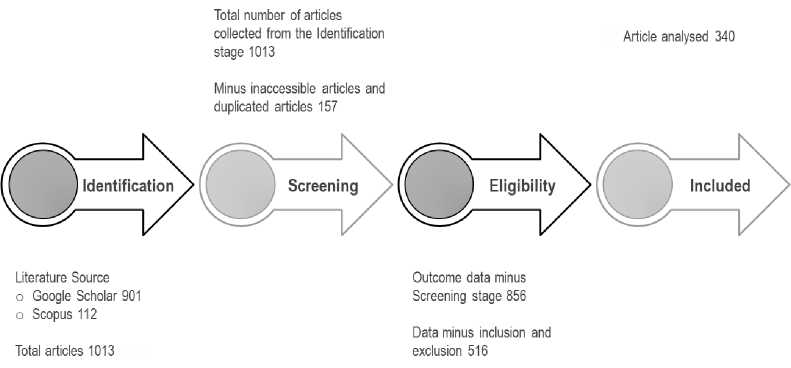
Figure 1: Stages of the PRISMA model.
Results
The results of the analysis of scientific publications on argumentation research trends in science education were identified based on the number of scientific publications, country of origin, type of publication, area of science, research methods used, research subjects, type of instrument used, and type of argumentation. Analysis using VOSviewer focused on three types of analysis, namely network visualization, overlay visualization, and density visualization.
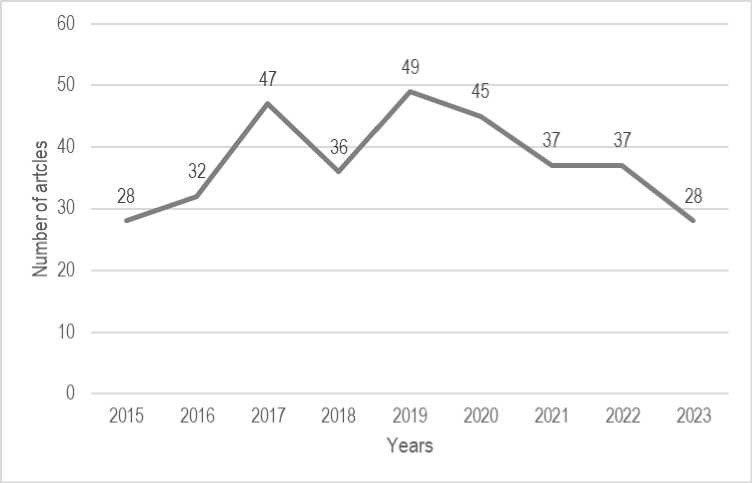
Figure 2. Scientific publications on the topic of argumentation in science learning analyzed from 2015-2023 by number of articles.
Based on Figure 2, the number of articles published between 2015-2023 experienced fluctuations in the number of articles published. The number of published articles has increased from 2015 to 2017 and peaked in 2019 but has decreased in recent years.
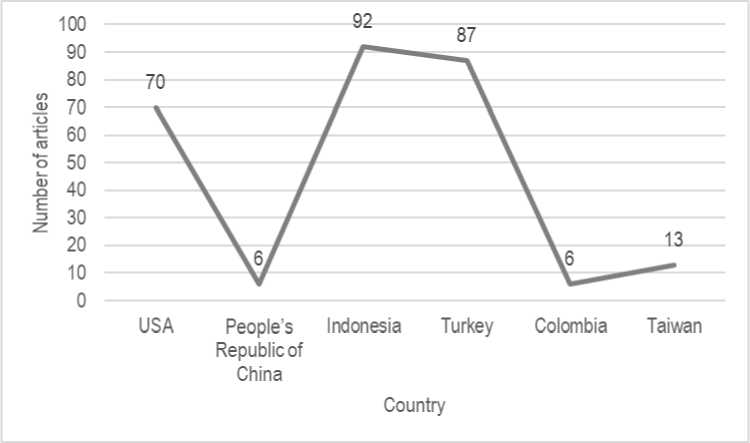
Figure 3. Scientific publications on the topic of argumentation in science learning analyzed from 2015-2023 by country of origin.
The number of scientific articles based on the country of origin is mostly from Indonesia, Turkey, and the United States, as can be seen in Figure 3. However, the number of scientific publications originating from Indonesia is mostly from conferences. The number of scientific publications in the form of journals dominates more than in the form of proceedings.
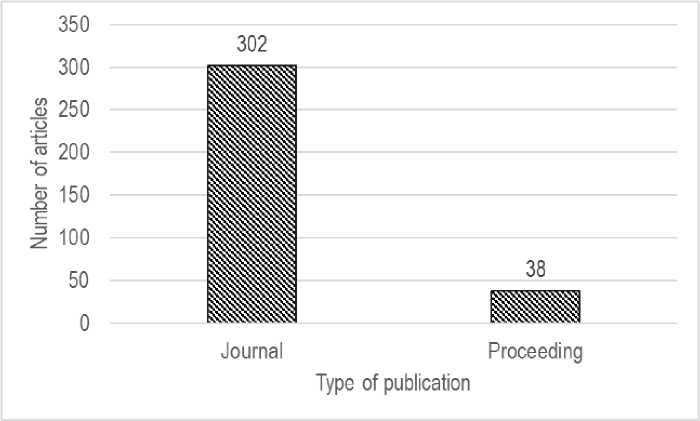
Figure 4. Scientific publications on the topic of argumentation in science learning analyzed from 2015-2023 by publication type.
The most research on argumentation in science education by area of science, based on Figure 5. is in natural science compared to biology, physics, and chemistry. Research on argumentation in biology, chemistry, and physics is still uneven when compared to research in natural science.
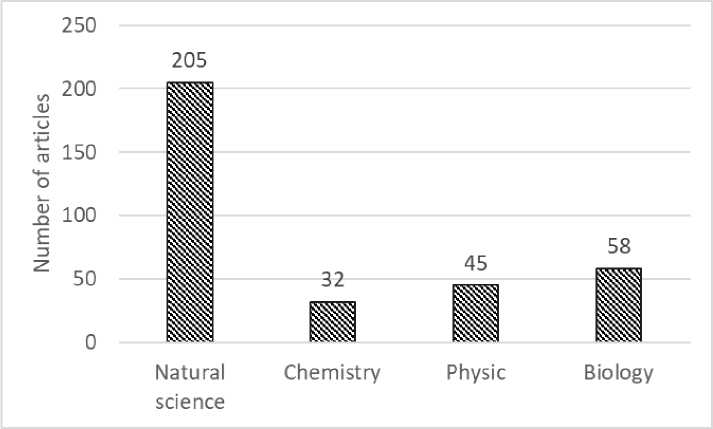
Figure 5. Scientific publications on the topic of argumentation in science learning analyzed from 2015-2023 by area of science.
The research subjects in argumentation research in science education are still based on Figure 6. Most of them are university students. The least research subjects are elementary school students. These data show that research on argumentation must still be improved on other research subjects so that it will provide complete information about the war of argumentation in education.
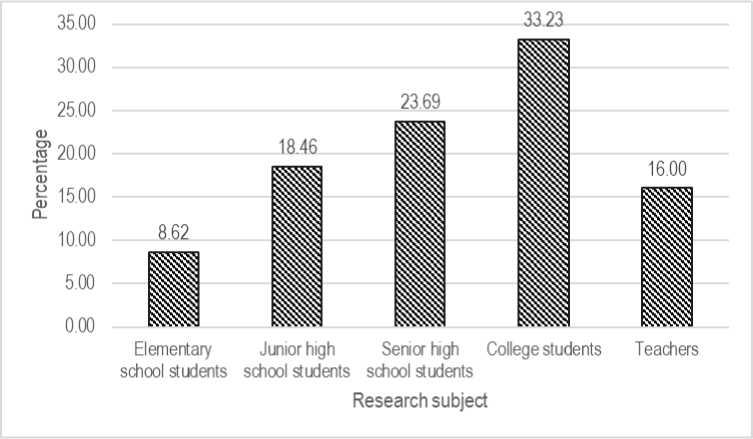
Figure 6. Scientific publications on the topic of argumentation in science learning analyzed from 2015-2023 by research subject.
The type of research conducted in argumentation research is mostly carried out in the empirical type, while other types of research are very different, as can be seen in Figure 7. Empirical research is a type of research that includes qualitative and quantitative approaches. Based on Figure 8, the most common types of empirical research are case study research and experimental research, as well as descriptive research. Grounded theory and exploratory research are the least used research.
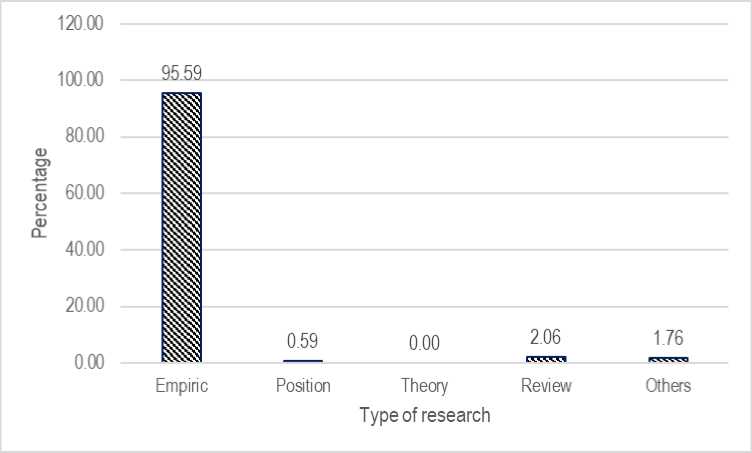
Figure 7. Scientific publications on the topic of argumentation in science learning analyzed from 2015-2023 by type of research.
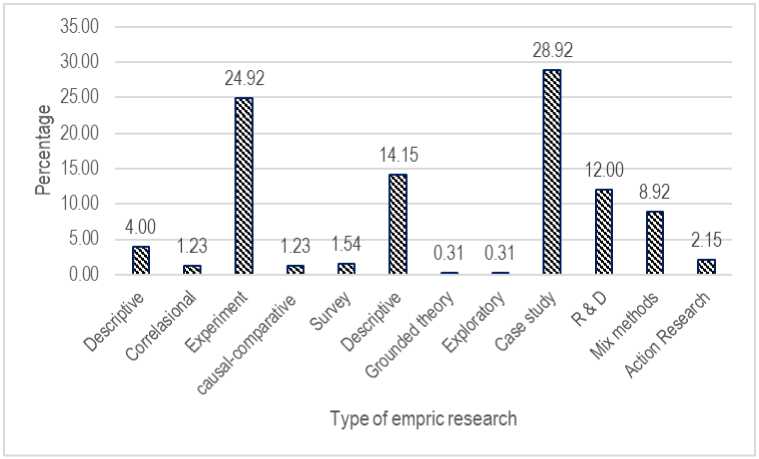
Figure 8. Scientific publications on the topic of argumentation in science learning analyzed from 2015-2023 based on type of empirical research.
The most widely used research instrument in argumentation research, based on Figure 9, is the non-test type, followed by the test form and a combination of both. The test type used as a research instrument is a form of description or multiple-choice test. The non-test type is a research instrument that uses rubrics, observation of activity sheets, and other tools. Researchers use a variety of research instruments to obtain complete information related to the research conducted. The use of appropriate research instruments will provide accurate information in a study.
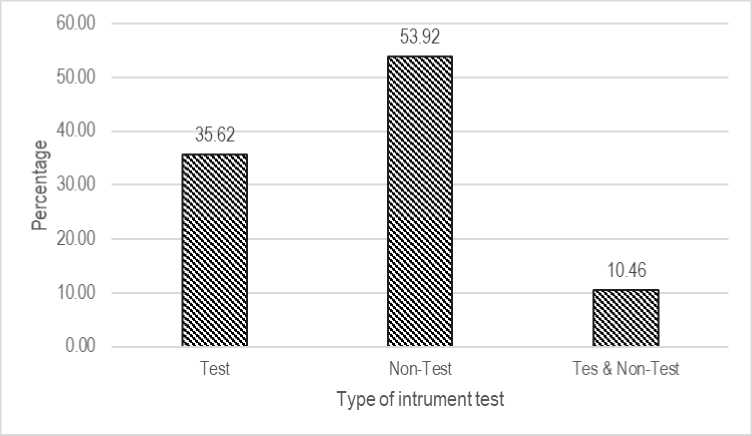
Figure 9. Scientific publications on the topic of argumentation in science learning analysed from 2015-2023 by type of instrument test.
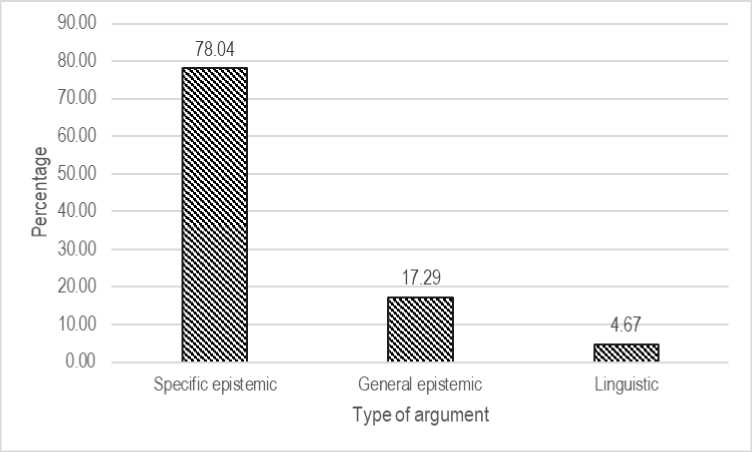
Figure 10. Scientific publications on the topic of argumentation in science learning analyzed from 2015-2023 by type of argument.
Based on Figures 10 and 11, the types of arguments that can be identified in the analyzed articles are mostly special epistemic types. The specific epistemic type relates to the structure of the argument elements that can be identified in the analyzed articles. The broader epistemic type is an argument related to inquiry and explanation . The linguistic type is the type of argument that relates to dialogue, discussion, and negotiation. The elements in the argument structure based on Figure 11. are mostly claims, while the least are grounds.
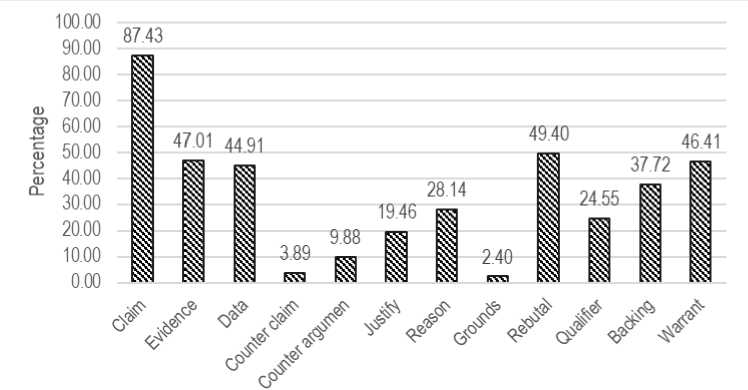
Element of specific epistemic
Figure 11. Scientific publications on the topic of argumentation in science learning analyzed from 2015-2023 based on elements of argument.
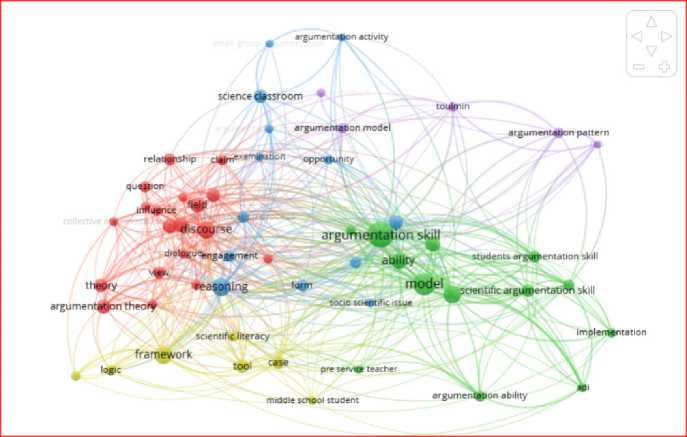
Figure 12. Network visualization of argumentation research in science education in 2015-2023.
Based on Figure 12, the results of analysis based on Network visualization give us an idea of some topics that are widely cited and have a close relationship with other topics. In general, there are five major groups of topics that can be distinguished by color, namely green, red, yellow, blue, and purple. Argumentation skills have many connections with other topics, so we can determine if argumentation skills are popular in many research articles.
The results of the analysis, based on overlay visualization Figure 13, show two main areas that are quite contrasting, namely yellow and dark blue. Argumentation skills can be described as a research topic that has been widely researched in recent years, indicated by the yellow or yellowish color. The difference between the two areas shows us that some of the tropics in the yellow-colored area mean that these topics are current topics.
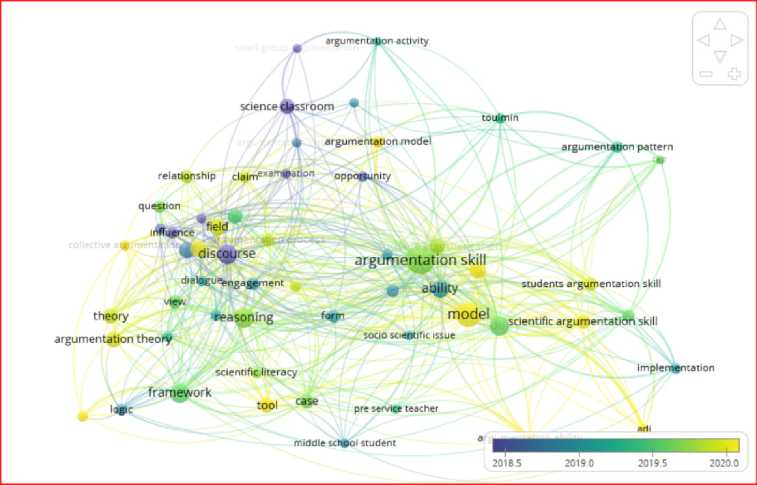
Figure 13. Overlay visualization of argumentation research in science education in 2015-2023.
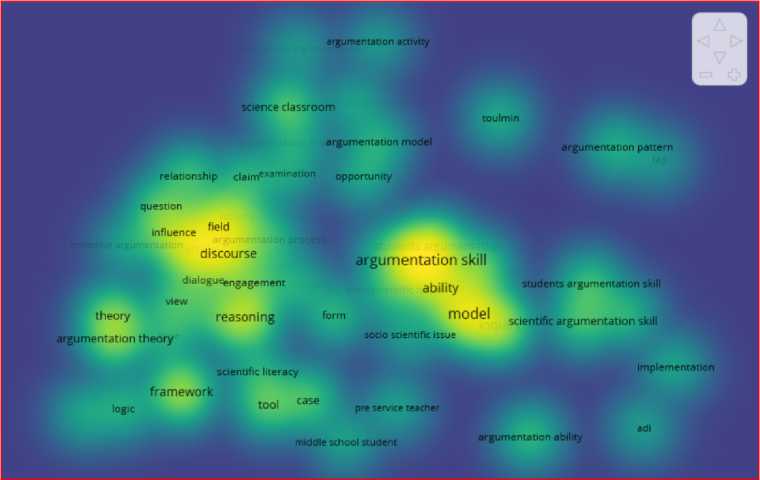
Figure 14. Density visualization of argumentation research in science education in 2015-2023.
In general, we can distinguish the analysis results based on Figure 14 from the colors. The yellow area shows that the term contained in that color has received a lot of attention from researchers, while the blue area shows the area that has received less attention from researchers. Researchers pay a lot of attention to argumentation research, including argumentation skills, abilities, models, discourse, reasoning, argumentation theory, and others. These results provide us with information regarding research gaps that we can develop in relation to current research trends.
Discussions
The study aimed to investigate argumentation research trends in science education. Research trends will provide an overview of the researchers’ research interests, approaches, and shared knowledge
( T.-C. Lin et al., 2014 ). Based on the data obtained, the research trend has increased from 2015-2023. However, the increase in the number of publications fluctuated, especially due to the ups and downs in the number of publications during this period. Scientific publication is one of the important tasks for researchers ( T.-J. Lin et al., 2019 ) to disseminate the results of their research either in the form of journals or proceedings.
Several countries have contributed to argumentation research in science education, including Indonesia, Turkey, the USA, Taiwan, Colombia, and the People’s Republic of China, either in the form of journals or proceedings. Argumentation research in science education has attracted researchers around the world in the last decade ( Yilmaz et al., 2017 ). Science education research has been conducted through various learning environments that support argumentation skills ( Erduran et al., 2015 ; Lazarou et al., 2016 ). Argumentation has been researched at various levels of education and in various subjects to identify the role of argumentation in science learning. Students’ argumentation skills in science learning need to be supported by language skills to receive and understand information and express their learning ( González-Howard et al., 2017 ).
The most argumentation research areas based on science fields are in the natural science area compared to the areas in chemistry, physics, and biology. This is due to the large number of studies conducted at the primary school to university level and teachers who focus their research on science subjects. Argumentation is one of the main areas of research in science education ( Erduran et al., 2019 ). Based on the research subject, most arguments are made in universities. Universities are centers of educational development and innovation, so it is natural that the trend of argumentation research is mostly carried out in universities. Argumentation skills are one of the main generic skills that must be possessed by a student studying in college ( Kleemola et al., 2022 ).
In general, the most widely used type of research is empirical research. Empirical research using either quantitative or qualitative approaches dominates all research to identify the role of argumentation in science education. Argumentation attracts a lot of researchers’ attention, especially in some cases the role of argumentation in learning is widely studied. In addition, teachers have an important role in creating epistemologically rich and productive learning experiences to develop students’ skills ( Sengul et al., 2020 ).
The use of various instruments in research is an effort to obtain more accurate and comprehensive information. The type of research instrument that is widely used is the non-test type. Assessment criteria using rubrics is one form of instrument that is widely used to measure the quality of argumentation skills, including in the research of González-Howard et al. (2017) , Chen et al. (2016) , Short et al. (2020) , and Özçinar (2015) . The development of appropriate rubrics to measure argumentation skills has been widely developed. Some assessment instruments refer to Toulmin’s theory of argumentation, although some of its basic elements have been developed. Argumentation assessment using research rubrics has developed along with many studies on argumentation.
Arguments can be categorized into three groups, namely epistemic specific argumentation, epis-temic general / broader, and linguistic ( Erduran et al., 2015 ). The specific epistemic type of argument is the most identified aspect in research, especially related to the elements of argument. Research on argumentation has attracted many researchers to specifically examine the elements of argumentation in various fields of science and education. In particular, the most important element of argumentation is the claim argumentation element, followed by a rebuttal and a warrant. Argumentation refers to the process of making an argument ( Namdar and Shen, 2016 ) which is one of the main objectives of science learning ( Wang and Buck, 2016 ). Many researchers have examined argumentation, especially the argumentation structure based on Toulmin ( Heng et al., 2015 ). The argumentation structure, according to Toulmin (2003) , consists of claims, data, warrants, qualifiers, backing, and rebuttals. Claim, data, and warrant are the most widely used elements in Toulmin’s argumentation ( Erduran, 2007 ; Moon et al., 2017 ).
Science requires the construction of models or theories that can explain natural phenomena rather than just a set of facts (Pabuccu and Erduran, 2017). Argumentation is one of the important elements that must be developed in science learning to develop scientific literacy, critical thinking, reasoning, communicative and metacognitive skills, and other supporting skills (Erduran et al., 2015; Lazarou et al., 2016). Teacher-student interactions in the classroom play an important role in promoting productive argumentation (Sandoval et al., 2019). Scientific argumentation is included by science teachers as one of their learning objectives. In addition, dialogic interaction between students in argumentation will improve the argumentation ability of students who have different initial knowledge (Liu et al., 2019). Argumentation skills are fundamental to developing communication skills and building scientific explanations. The scientific argumentation learning approach has a great influence on students’ science process skills, which are the basis of scientific literacy (Gultepe and Kilic, 2015).
Argumentation research trends in science education can provide evidence-based indicators of where more emphasis needs to be placed in future research on argumentation( Erduran et al., 2015 ). Argumentation in science learning will impact the understanding of scientific concepts ( Heng et al., 2015 ). Information about argumentation research will provide an overview for researchers to find gaps in research topics related to argumentation. Argumentation research for both students and teachers is important to provide an overview for researchers or other educational practitioners to conduct research.
Argumentation skills based on the results of analysis using VOSviewer have a close relationship with several other research topics. Argumentation research is still getting a lot of attention from researchers, especially in recent years, and has become an objective in the curriculum in various countries ( Yilmaz et al., 2017 ). Argumentation research will be one of the interesting research topics in the future, especially for science learning in relation to its relationship with scientific literacy and level thinking skills. Researchers based on this information will get an idea of how to develop further argumentation research.
Conclusions
Based on the data obtained, it can be concluded that argumentation research in science education between 2015 and 2023 can provide important information about the application of argumentation that has been applied in science education, as well as certain variables of the application of argumentation that need further research in the future. Research on argumentation in science education has increased from year to year from various countries in the world, especially from Indonesia, Turkey, and the USA. Most scientific publications are in the form of journals compared to proceedings. Argumentation research is widely applied to various fields of science, especially natural science, with religious research subjects from primary education to higher education and science teachers. The type of research used is empirical, mainly in the form of case studies, experiments, and descriptive. In particular, the type of argumentation identified is more focused on epistemic specifically, namely related to the type of argument, especially referring to Toulmin’s argument structure. Based on the results of the analysis using VOSviewer, it can provide information that argumentation skills are an important topic in research that has a relationship with several other variables in science education and has received attention from researchers in recent years. The implications of the findings of this study provide information about the application of argumentation in science education, especially for researcher.
Conflict of interests
The authors declare no conflict of interest.
Author Contributions
All persons who meet authorship criteria A.M., H.H., B.S. are listed as authors, including participation in the conceptualization, formal analysis, methodology: A.M., H.H. and B.S.; software, A.M.; investigation, A.M.; visualization: A.M., H.H. and B.S.; writing—original draft preparation, A.M.; and writing—review and editing: A.M., H.H. and B.S.. All authors have read and agreed to the published version of the manuscript.
Список литературы Literature review: a snapshot of research on the argumentation of bibliometric analysis in the period 2015-2023
- Abdullah, K. H. (2022). Publication trends in biology education: a bibliometric review of 63 years. Journal of Turkish Science Education, 19(2), 465-480. https://tused.org/index.php/tused/article/view/1190
- Admoko, S., R J, M. N., Hariyono, E., & Madlazim. (2021). Bibliometric profile of science education research on argumentation and the contribution of Indonesia. Advances in Engineering Research, 209(Ijcse), 502-509. https://www.atlantis-press. com/proceedings/ijcse-21/125966505
- Arruda, H., Silva, E. R., Lessa, M., Proenga, D., & Bartholo, R. (2022). VOSviewer and bibliometrix. Journal of the Medical Library Association, 110(3), 392-395. https://doi.org/10.5195/jmla.2022.1434
- Cankaya, O., & Aydogan, N. (2022). The relationship between argumentation skills and cognitive flexibility of pre-service science teachers. Asian JournalofEducation and Training, 8(2), 51-59. https://doi.org/10.20448/edu.v8i2.3963
- Chalkiadaki, A. (2018). A systematic literature review of 21st century skills and competencies in primary education. International Journal of Instruction, 11 (3), 1-16. https://doi.org/10.12973/iji.2018.1131a
- Chen, H. T., Wang, H. H., Lu, Y. Y., Lin, H. S., & Hong, Z. R. (2016). Using a modified argument-driven inquiry to promote elementary school students' engagement in learning science and argumentation. International Journal of Science Education, 38(2), 170-191. https://doi.org/10.1080/09500693.2015.1134849
- Cheng, P., Tang, H., Dong, Y., Liu, K., Jiang, P., & Liu, Y. (2021). Knowledge mapping of research on land use change and food security: A visual analysis using citespace and vosviewer. International Journal of Environmental Research and Public Health, i8(24). https://doi.org/10.3390/ijerph182413065
- Dede, E., & Ozdemir, E. (2022). Mapping and performance evaluation of mathematics education research in Turkey: A bibliometric analysis from 2005 to 2021. Journal ofPedagogical Research. https://doi.org/10.33902/jpr.202216829
- Dewi, P. S., Widodo, A., Rochintaniawati, D., & Prima, E. C. (2021). Web-Based Inquiry in Science Learning: Bibliometric Analysis. Indonesian Journal of Science and Mathematics Education, 4(2), 191-203. https://doi.org/10.24042/ijsme. v4i2.9576
- Erduran, S. (2007). Methodological foundations in the study of argumentation in science classrooms. In S. Erduran & M. P. Jimenez-Aleixandre (Eds.), Argumentation in science education (pp. 47-69). Springer, Science and Technology Education Library. https://doi.org/http://dx.doi.org/10.1007/978-1-4020-6670-2
- Erduran, S., Guilfoyle, L., Park, W., Chan, J., & Fancourt, N. (2019). Argumentation and interdisciplinarity: reflections from the Oxford Argumentation in Religion and Science Project. Disciplinary and Interdisciplinary Science Education Research, i(1), 1-10. https://doi.org/10.1186/s43031-019-0006-9
- Erduran, S., Ozdem, Y., & Park, J. Y. (2015). Research trends on argumentation in science education: a journal content analysis from 1998-2014. InternationalJournalofSTEMEducation, 2(1), 1-12. https://doi.org/10.1186/s40594-015-0020-1
- Faize, F. A., Husain, W., & Nisar, F. (2018). Acritical review of scientific argumentation in science education. Eurasia Journal of Mathematics, Science and TechnologyEducation, 14(1), 475-483. https://doi.org/10.12973/ejmste/80353
- Gonzalez-Howard, M., McNeill, K. L., Marco-Bujosa, L. M., & Proctor, C. P. (2017). 'Does it answer the question or is it French fries?': an exploration of language supports for scientific argumentation. International Journal of Science Education, 39(5), 528-547. https://doi.org/10.1080/09500693.2017.1294785
- Grooms, J., Sampson, V., & Enderle, P. (2018). How concept familiarity and experience with scientific argumentation are related to the way groups participate in an episode ofargumentation. February, 1-23. https://doi.org/10.1002/tea.21451
- Gultepe, N., & Kilic, Z. (2015). Effect of scientific argumentation on the development of scientific process skills in the context of teaching chemistry. International Journal of Environmental and Science Education, 10(1), 111-132. https://eric. ed.gov/?id=EJ1060989
- Henderson, J. B., McNeill, K. L., Gonzalez-Howard, M., Close, K., & Evans, M. (2018). Key challenges and future directions for educational research on scientific argumentation. Journal of Research in Science Teaching, 55(1), 5-18. https://doi. org/10.1002/tea.21412
- Heng, L. L., Surif, J., & Seng, C. H. (2015). Malaysian students' scientific argumentation: Do groups perform better than individuals? International Journal ofScience Education, 37(3), 505-528. https://doi.org/10.1080/09500693.2014.995147
- Higgins, J. P. T., Thomas, J., Chandler, J., Cumpston, M., Li, T., Page, M. J., & Welch, V. A. (2019). Cochrane Handbook for Systematic Reviews oflnterventions (2nd ed., Vol. 2). The Cochrane Collaboration and John Wiley & Sons Ltd.
- Ilma, A. Z., Wilujeng, I., Widowati, A., Nurtanto, M., & Kholifah, N. (2023). A systematic literature review of STEM education in Indonesia (2016-2021): Contribution to improving skills in 21st century learning. Pegem Egitim ve Ogretim Dergisi, 13(2), 134-146. https://doi.org/10.47750/pegegog.13.02.17
- Kilinc, A., Demiral, U., & Kartal, T. (2017). Resistance to dialogic discourse in SSI teaching: The effects of an argumentation-based workshop, teaching practicum, and induction on a preservice science teacher. Journal of Research in Science Teaching, 54(6), 764-789. https://doi.org/10.1002/tea.21385
- Kleemola, K., Hyytinen, H., & Toom, A. (2022). The Challenge of Position-Taking in Novice Higher Education Students' Argumentative Writing. FrontiersinEducation, 7(May), 1-14. https://doi.org/10.3389/feduc.2022.885987
- Lazarou, D., Sutherland, R., & Erduran, S. (2016). Argumentation in science education as a systemic activity: An activity-theoretical perspective. International Journal of Educational Research, 79, 150-166. https://doi.org/10.1016/j.ijer.2016.07.008
- Lee, M. H., Wu, Y. T., & Tsai, C. C. (2009). Research trends in science education from 2003 to 2007: A content analysis of publications in selected journals. International Journal of Science Education, 3i(15), 1999-2020. https://doi. org/10.1080/09500690802314876
- Lin, T.-C., Lin, T.-J., & Tsai, C.-C. (2014). Research trends in science education from 2008 to 2012: A systematic content analysis of publications in selected journals. International Journal ofScience Education, 36(8), 1346-1372. https://doi.org/1 0.1080/09500693.2013.864428
- Lin, T.-J., Lin, T.-C., Potvin, P., & Tsai, C.-C. (2019). Research trends in science education from 2013 to 2017: A systematic content analysis of publications in selected journals. International Journal ofScience Education, 41(3), 367-387. https:// doi.org/10.1080/09500693.2018.1550274
- Liu, Q. T., Liu, B. W., & Lin, Y. R. (2019). The influence of prior knowledge and collaborative online learning environment on students' argumentation in descriptive and theoretical scientific concept. International Journal ofScience Education, 41(2), 165-187. https://doi.org/10.1080/09500693.2018.1545100
- McNeill, K. L., González-Howard, M., Katsh-Singer, R., & Loper, S. (2016). Pedagogical content knowledge of argumentation: Using classroom contexts to assess high-quality PCK rather than pseudoargumentation. Journal of Research in Science Teaching, 53(2), 261-290. https://doi.org/10.1002/tea.21252
- McNeill, K. L., GonzÁlez-Howard, M., Katsh-Singer, R., & Loper, S. (2017). Moving beyond pseudoargumentation: teachers' enactments of an educative science curriculum focused on argumentation. Science Education, 101(3), 426-457. https://doi.org/10.1002/sce.21274
- McNeill, K. L., Katsh-Singer, R., González-Howard, M., & Loper, S. (2016). Factors impacting teachers' argumentation instruction in their science classrooms. International Journal ofScience Education, 38(12), 2026-2046. https://doi.org/10.10 80/09500693.2016.1221547
- Moher, D., Liberati, A., Tetzlaff, J., & Altman, D. G. (2009). Preferred reporting items for systematic reviews and meta-analyses: The PRISMA statement. In British Medical Journal (Vol. 339, Issue 7716, pp. 332-336). https://doi.org/10.1136/bmj. b2535
- Moon, A., Stanford, C., Cole, R., & Towns, M. (2017). Analysis of inquiry materials to explain complexity of chemical reasoning in physical chemistry students' argumentation. Journal of Research in Science Teaching, 54(10), 1322-1346. https:// doi.org/10.1002/tea.21407
- Muhammad, U. A., Fuad, M., Ariyani, F., & Suyanto, E. (2022). Bibliometric analysis of local wisdom-based learning: Direction for future history education research. International Journal of Evaluation and Research in Education, 11 (4), 2209-2222. https://doi.org/10.11591/ijere.v11i4.23547
- Namdar, B., & Shen, J. (2016). Intersection of argumentation and the use of multiple representations in the context of socio-scientific issues. International Journal of Science Education, 38(7), 1100-1132. https://doi.org/10.1080/09500693.20 16.1183265
- Nordin, N. A. H. M. (2022). A bibliometric analysis of computational mapping on publishing teaching science engineering using VOSviewer application and correlation. Indonesian Journal of Teaching in Science, 2(2), 127-138. https://ejournal.upi. edu/index.php/IJoTis/article/view/47038
- Osborne, J. F., Henderson, J. B., MacPherson, A., Szu, E., Wild, A., & Yao, S. Y. (2016). The development and validation of a learning progression for argumentation in science. Journal of Research in Science Teaching, 53(6), 821-846. https:// doi.org/10.1002/tea.21316
- Ozçinar, H. (2015). Scaffolding computer-mediated discussion to enhance moral reasoning and argumentation quality in pre-service teachers. JournalofMoralEducation, 44(2), 232-251. https://doi.org/10.1080/03057240.2015.1043875
- Pabuccu, A., & Erduran, S. (2017). Beyond rote learning in organic chemistry: the infusion and impact of argumentation in tertiary education. International Journal of Science Education, 39(9), 1154-1172. https://doi.org/10.1080/09500693.2 017.1319988
- Putri, W. E., Sunarno, W., & Marzuki, A. (2021). Analysis of the students' argumentative skills of senior high school in covid-19 pandemic using problem based learning in static fluid. Jurnal Penelitian Pendidikan IPA, 7(3), 335-343. https://doi. org/10.29303/jppipa.v7i3.735
- Rodrigues-Silva, J., & Alsina, Á. (2023). Systematic review about students' conceptions of engineering accessed through drawings: Implications to STEAM education. International Journal of Cognitive Research in Science, Engineering and Education, 11 (2), 199-211. https://doi.org/10.23947/2334-8496-2023-11-2-199-211
- Sandoval, W. A., Enyedy, N., Redman, E. H., & Xiao, S. (2019). Organising a culture of argumentation in elementary science. International Journal ofScience Education, 4i(13), 1848-1869. https://doi.org/10.1080/09500693.2019.1641856
- Sengul, O., Enderle, P. J., & Schwartz, R. S. (2020). Science teachers' use of argumentation instructional model: linking PCK of argumentation, epistemological beliefs, and practice. International Journal of Science Education, 42(7), 1068-1086. https://doi.org/10.1080/09500693.2020.1748250
- Short, R. A., Van der Eb, M. Y., & McKay, S. R. (2020). Effect of productive discussion on written argumentation in earth science classrooms. JournalofEducationalResearch, 113(1), 46-58. https://doi.org/10.1080/00220671.2020.1712314
- Silber-Varod, V., Eshet-Alkalai, Y., & Geri, N. (2019). Tracing research trends of 21st-century learning skills. In British Journal of Educational Technology (Vol. 50, Issue 6, pp. 3099-3118). Blackwell Publishing Ltd. https://doi.org/10.1111/bjet.12753
- Simonovic, N. (2021). Teachers' key competencies for innovative teaching. International Journal of Cognitive Research in Science, Engineering andEducation, 9(3), 331-345. https://doi.org/10.23947/2334-8496-2021-9-3-331-345
- Suwandi, T., Rahmat, A., Jamil, M. W., & Nurkhalishah, S. (2023). Research trends on biology digital modules: A bibliometric analysis. Biosfer, 16(1), 13-24. https://doi.org/10.21009/biosferjpb.31361
- Toulmin, S. E. (2003). The uses ofargument, updated edition (2nd ed.). Cambridge University Press.
- Ubaidillah, M., Marwoto, P., Wiyanto, W., & Subali, B. (2023). Problem solving and decision-making skills for ESD: A bibliometric analysis. International Journal of Cognitive Research in Science, Engineering and Education, 11 (3), 401-415. https://doi.org/10.23947/2334-8496-2023-11 -3-401-415
- van Laar, E., van Deursen, A. J. A. M., van Dijk, J. A. G. M., & de Haan, J. (2020). Determinants of 21st-century skills and 21st-century digital skills for workers: a systematic literature review. SAGE Open, 10(1), 1-14. https://doi. org/10.1177/2158244019900176
- Wang, J., & Buck, G. A. (2016). Understanding a high school physics teacher's pedagogical content knowledge of argumentation. Journal ofScience TeacherEducation, 27(5), 577-604. https://doi.org/10.1007/s10972-016-9476-1
- Yilmaz, Y. O., Cakiroglu, J., Ertepinar, H., & Erduran, S. (2017). The pedagogy of argumentation in science education: science teachers' instructional practices. International Journal of Science Education, 39(11), 1443-1464. https://doi.org/10.10 80/09500693.2017.1336807

